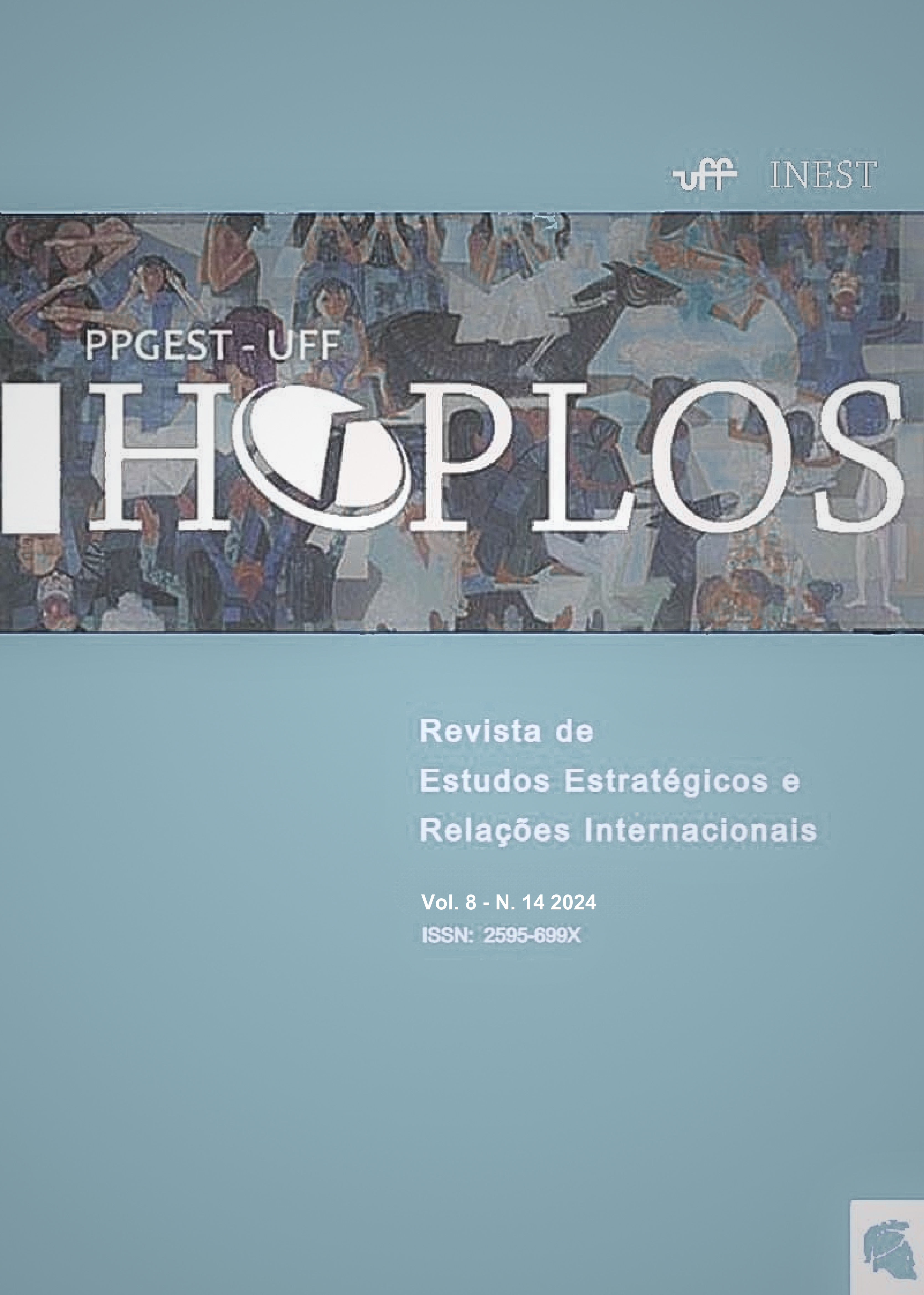CLASH OF CIVILIZATIONS:
REVISITING THE WORK OF SAMUEL HUNTINGTON
Keywords:
Clash of civilizations, Geopolitics, HuntingtonAbstract
This article revisits Samuel Huntington's work and theory of the clash of civilizations. This theory, widespread in the early 1990s, proposes that the cultural and religious identities present in civilizations would be the main cause of conflicts in the post-Cold War world. This theory challenges traditional views that explain the origins of global conflicts and power relations, which are present in political and economic issues, attributing importance to cultural and behavioral aspects. In his argument, Huntington brings us that the cultural differences between civilizations, especially regarding values, beliefs and traditions, will make conflicts between them inevitable. Such statements are verifiable today, with several conflicts over religious issues and land spaces. However, it is a controversial theory, since its idea advocates certain peoples and a prophecy of conflicts that never developed on reality.
Downloads
References
ABOZAID, A. M. “Clash of Civilizations” at Twenty-Five. Contemporary Arab Affairs, [s. l.] v. 11, n. 4, 2018, p. 135–158. Disponível em: https://doi.org/10.1525/caa.2018.114007. Acesso em: 19 jun. 2024.
BERMAN, E.; LAKE, D. A.; MACDONALD, J. (org.). Proxy wars: suppressing violence through local agents. Ithaca: Cornell University Press, 2019.
BROWN, W. Nas ruínas do neoliberalismo: a ascensão da política antidemocrática no Ocidente. São Paulo: Politeia, 2019.
EDWARDS, C. What we know about Israel’s Supreme Court ruling on Netanyahu’s judicial overhaul. In: CNN INTERNATIONAL. 2 jan. 2024. Disponível em: https://edition.cnn.com/2024/01/02/middleeast/israel-supreme-court-ruling-netanyahu- explained-intl/index.html. Acesso em: 23 jun. 2024.
ESPOSITO, J. L. The Islamic threat: myth or reality? 3. ed. New York: Oxford University Press, 1999.
FERGUSON, N. Civilization: the West and the rest. New York: Penguin Books, 2011. FUKUYAMA, F. The end of history and the last man. 1. ed. New York: Free Press, 1992.
HUNTINGTON, S. O choque de civilizações. 1. ed. Rio de Janeiro: Objetiva, 1997.
HUNTINGTON, S. P. The Clash of Civilizations?. Foreign Affairs, [s. l.], v. 72, n. 3, 1993, p. 99-118. Disponível em: https://www.foreignaffairs.com/articles/united-states/1993-06- 01/clash-civilizations. Acesso em: 19 jun. 2024.
KANAAN, H. S. O fim da história e o último homem (Francis Fukuyama). PerCursos, [s. l.], v. 6, n. 1, 2005, p. 1-10. Disponível em: https://revistas.udesc.br/index.php/percursos/article/view/1451. Acesso em: 21 jun. 2024
KAPLAN, R. D. The coming anarchy: shattering the dreams of the post Cold War. 1. eded. New York: Random House, 2000.
KOTKIN, S. Armageddon averted: the Soviet collapse, 1970-2000. Updated editioned. Oxford: Oxford University Press, 2008.
LEWIS, B. The Roots of Muslim Rage. The Atlantic, [s. l.], v. 266, n. 3, 1990, p. 47–60. Disponível em: https://www.theatlantic.com/magazine/archive/1990/09/the-roots-of-muslim- rage/304643/. Acesso em: 19 jun. 2024.
LEWIS, B. What went wrong? western impact and Middle Eastern response. 1. ed. Oxford: Oxford University Press, 2001.
MARSDEN, A. Netanyahu’s corruption trial resumes under shadow of war. In: THE JERUSALEM POST. 3 dez. 2023. Disponível em: https://www.jpost.com/israel-news/politics- and-diplomacy/article-776354. Acesso em: 23 jun. 2024.
MEARSHEIMER, J. J. The tragedy of Great Power politics. New York: Norton, 2001.
MIELNICZUK, F. Rússia e Ucrânia: a guerra que “não pode ser vencida”. Conjuntura Austral, [s. l.], v. 13, n. 64, 2022, p. 7–15. Disponível em: https://doi.org/10.22456/2178- 8839.128328. Acesso em: 23 jun. 2024.
NOGUEIRA, J. Teoria Das Relações Internacionais. São Paulo: Elsevier, 2006.
NORRIS, P.; INGLEHART, R. Islam & the West: Testing the Clash of Civilizations Thesis. SSRN Electronic Journal, [s. l.], 2002. Disponível em: http://dx.doi.org/10.2139/ssrn.316506. Acesso em: 19 jun. 2024.
SAID, E. W. The Clash of Ignorance. In: DITTMER & SHARP (Ed.) GEOPOLITICS: AN INTRODUCTORY READER. New York: Routledge, 2014. Cap: 27.
SANTOS, A. D. M. O REALISMO NA TEORIA DAS RELAÇÕES INTERNACIONAIS. Caderno de Relações Internacionais, [s. l.] v. 3, n. 5, 2016, p.84-92. Disponível em: https://revistas.faculdadedamas.edu.br/index.php/relacoesinternacionais/article/view/239. Acesso em: 19 jun. 2024.
ZAKARIA, F. The future of freedom: illiberal democracy at home and abroad. New York: Norton, 2007.
Downloads
Published
How to Cite
Issue
Section
License
Copyright (c) 2024 Roberta Krewer Molina

This work is licensed under a Creative Commons Attribution-NonCommercial-ShareAlike 4.0 International License.
1. PROPOSTA DE POLÍTICA PARA PERIÓDICOS DE ACESSO LIVRE
Autores que publicam nesta revista concordam com os seguintes termos:
a. Autores mantém os direitos autorais e concedem à revista o direito de primeira publicação, com o trabalho simultaneamente licenciado sob a Licença Internacional Creative Commons Attribution - Share Alike 4.0 que permite o compartilhamento do trabalho com reconhecimento da autoria e publicação inicial nesta revista.
b. Autores têm autorização para assumir contratos adicionais separadamente, para distribuição não-exclusiva da versão do trabalho publicada nesta revista (ex.: publicar em repositório institucional ou como capítulo de livro), com reconhecimento de autoria e publicação inicial nesta revista.
c. Autores têm permissão e são estimulados a publicar e distribuir seu trabalho online (ex.: em repositórios institucionais ou na sua página pessoal) a qualquer ponto antes ou durante o processo editorial, já que isso pode gerar alterações produtivas, bem como aumentar o impacto e a citação do trabalho publicado (Veja O Efeito do Acesso Livre).








